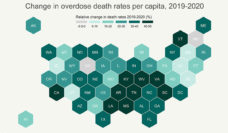Why do you go to the library? The answer may be as simple as checking out a book or as complex as needing a roof over your head. Public libraries open their doors to everyone, making them a safe haven for people who may have nowhere else to go. This unique position in the community may make public libraries key players in fighting the opioid overdose epidemic.
Over 100,306 people died from a drug overdose in the United States from April 2020 – April 2021. 75,673 of these overdose deaths are attributed to opioids. The mass distribution of pharmaceutical opioids in the mid-90s caused the number of people with opioid use disorder to steadily rise. Eventually, many turned to the cheaper alternative, heroin. Then the highly potent synthetic opioid, fentanyl, catapulted the overdose epidemic into one of the most tragic public health emergencies of the modern era.
The higher rates of drug use have made overdoses more common, especially in public spaces. Public libraries are accessible to over 95% of the U.S. population, and opioid use within library walls can be a common occurrence in areas with high opioid use rates.
Opioid overdoses can be reversed with medications commonly known as Naloxone (generic) or Narcan (brand name), which can be either in nasal spray or injection form. Having these opioid overdose reversal medications available in public places is becoming more common practice to prevent unnecessary death.
How does this more active role in overdose prevention affect library staff?
Some municipal library systems have already taken action. Earlier this year, the city of Chicago announced that Narcan nasal spray is now available in wall-mounted boxes at 14 branches in areas with high overdose rates. Boston city buildings and select public libraries also received opioid overdose reversal kits in 2019. Several Philadelphia city libraries hosted pubic overdose response training sessions in 2018 and now offer virtual overdose response training sessions. Other cities are following suit, but how does this more active role in overdose prevention affect library staff?
Margaret Lowenstein and colleagues interviewed 44 librarians across the U.S. to assess how libraries and staff are currently handling the opioid epidemic. Almost all respondents reported the crisis was directly affecting their library and/or community with 6 of the respondents witnessing an overdose at their library within the past year.
Administering naloxone is fairly simple after being trained, but the drug administrator has to be comfortable and willing to do it. Approximately 75% of library staff in Lowenstein’s study were sympathetic but hesitant about acting as a first responder. They cited reasons such as lack of confidence, concern they would mistake a sleeping person as someone overdosing, and simply not being comfortable with the role of first responder. Many of the respondents supported providing overdose response training and having naloxone on hand, but emphasized that library staff participation should be voluntary.
Community perceptions and stigma surrounding substance use could also prevent libraries from participating in overdose prevention strategies. Emergent BioSolutions, the producer of Narcan, offered two free doses of the drug to every public library in the country in 2018. As of 2020, only 2.2% of libraries had accepted the free supply. Some libraries opted out because they already had opioid overdose reversal medication available. Others chose not to stock the drug for reasons such as staff safety and believing it would increase substance use at the library.
The lack of harm reduction solutions and official safe injection facilities in the U.S. may have caused libraries to take on this new role. As libraries adjust to the needs of their community, library staff must determine how they would respond in the face of an overdose. Public libraries play an integral role in community health, and their part in the overdose epidemic will continue to save lives.
Photo via Getty Images














